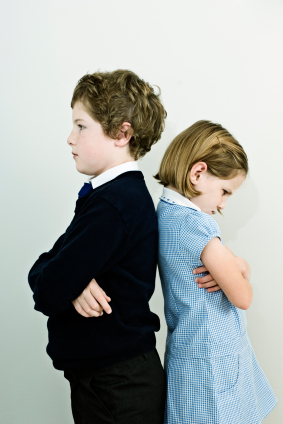
Summertime sibling rivalry
While you could avoid some of this problem by creating structure or enrolling one or more of your children in weeklong summer camps or day programs, the problem still remains. Children need to learn how to get along with each other. The conflict-resolution skills they learn at home will be applied throughout their lives.
Although the issues our children fight over may seem absurd and petty to adults, the actual dispute in question is rarely the issue actually being fought over. Control, power, and self-worth are usually at the heart of these skirmishes. Winning these battles becomes a matter of proving who is more worthy, lovable, or appreciated and taps into the deepest part of a child’s self-esteem. Our children often don’t know how to ask for a smile, a hug, or some words of appreciation—they or feel uncomfortable asking—so instead they fall back on what they do know will get a parent’s attention: fighting and bickering over what is fair or not fair in their worldview.
The very nature of the sibling relationship is unequal. Older children are generally more physically capable, stronger, and intimidating than their younger siblings. They are also usually more skilled verbally. Until children learn positive ways of managing the conflict on their own, parental intervention may be necessary.
Family dynamics create a unique environment for learning peacemaking skills. While oldest children generally feel more stress and anxiety about taking new steps and entering into new life stages, younger children may feel less competent and never really able to measure up to their older and more capable sibling(s). Oldest children have a tendency toward perfectionism and are very hard on themselves, especially when they perceive that they didn’t perform as they feel they should have. Younger children, on the other hand, are more likely to struggle with confidence issues because they want to be like their older sibling(s) but will not really be on equal footing until both are fully grown adults. This, however, is a model for the larger world when our children will—perhaps even as adults—come into conflict with persons who are more competent or less skilled than they are.
Helping our children clarify their needs and expressing them without judgment may be a challenge, but it is a skill our children need in order to become the peacemakers of the future. Active listening on our part encourages reflection and clarification and is a powerful tool for parents to model for their children. It is also a great way of helping a child identify the real feelings he is experiencing and express them. When a child feels that her feelings are acknowledged and accepted, she will feel affirmed and change her behavior as a result.
When the family serves as a laboratory where children are given the opportunity to learn peaceful solutions, growth can come from sibling rivalry. This also means learning to forgive siblings when feels are hurt, expressing honest feelings with caring words, and truly listening to one another. Through practicing conflict management in the home—with their siblings and their parents—children and youth can learn important skills for peacemaking in the wider world.
Photo above © ClarkandCompany/istockphoto







